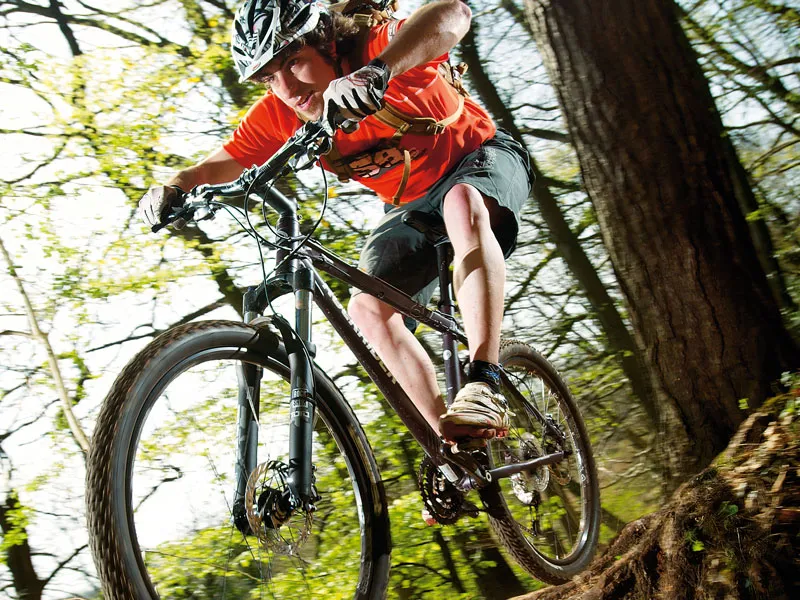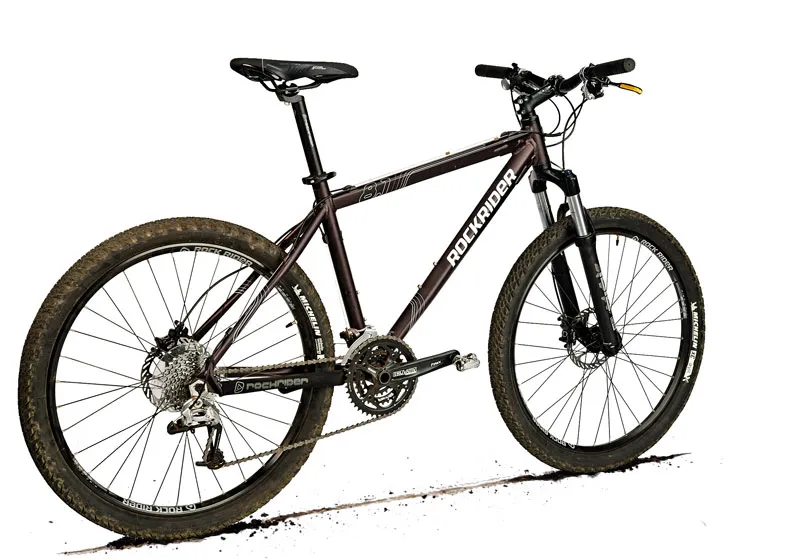French superstore giant Decathlon sells bikes at prices that must make other manufacturers weep – either that or shake their heads and mutter farcical conspiracies about Mafia money laundering. It’s done by cutting out the middle man, of course, but it looks like whoever specs the bikes isn’t given a budget, but rather a wheelbarrow full of cash.
The magic here is more a matter of the spec than the frame. Not that the frame is bad – far from it. Butted aluminium tubes are welded together in what Decathlon rightly calls a racing geometry jig.
The stays are svelte, and there’s the usual gusset to support the top of the down tube, since this is the bit that will fold or fail if you hit something hard enough with the front wheel – the ground, for example. The head tube features a sensible external headset, while the handlebar is narrow (600mm) and the stem long (100mm).
Most bikes at this price would be happy to have one or two items from the Rockrider’s spec list. The fork is one of the few Toras we’ve seen on any bike at £500 or below in 2010. It’s a 100mm 302 coil, which comes with a handlebar-mounted PopLoc remote lockout as well as rebound adjustment. This version of the RockShox Tora is a bit heavier than the SL, but performance feels much the same.
So what’s been sacrificed to fund the fork? Nothing. Some bikes tempt you with an uprated rear mech. The £500 Rockrider 8.1 gives you a full set of SRAM X7. It has an external bottom bracket, rather than cheap square taper and solidly performing Avid Juicy 3 brakes. It even has SPD pedals.
On top of all that there’s a free neoprene chainstay protector, and the bike arrived with the controls set up nicely inboard of the grips.
The narrower bar and longer stem of the Decathlon amplify its racy, old-school angles. Instead of sitting back a bit and working the bar at arm’s length like you do on, say, the Mongoose Tyax Elite, you find yourself nudging the saddle forward. And suddenly you’re in that charging forward body position, with your weight over the fork and thoughts of Lycra and leg razors drifting through your frontal lobe.
Once you’ve recalibrated your expectations to the bike’s character, it’s fine on trails. It picks up the pace well and isn’t twitchy, even over steppy sections. Where it makes your mouth go dry is on steep rollover drops, which will feel more precipitous than they actually are.
With a forward bias to your bodyweight, you’re acutely aware of the fork. The last Rockrider 8.1 we tested had a Tora 302 that was somewhat unyielding and prone to stiction. This one is much better. The amount of travel is still limited, but what travel you do get is composed and controlled. And the bigger (32mm) stanchions that Toras use mean that the front wheel stays where you point it even on choppy, cambered singletrack.
Michelin XC Dry tyres are even more focused on fast, firm trails than Kenda Small Block Eights. It’s easy to wash out the front wheel or wheelspin the rear in the mud that they’re not designed for, but that you will doubtless encounter – unless, of course, you’re an orange ex-pat reading this in Spain. And you don’t get that same ‘okay, too much, we’re giving up’ gradual submission to muddy conditions that the Kendas give.
Moving the saddle on its rails doesn’t just change the reach to the bars. it changes the effective seat tube angle and your weight distribution on the bike. With the stem, bars and fork supplied, it felt right to get forwards a bit — so that’s what we did.
Most budget hardtails come with basic flat pedals. The Rockrider 8.1 is adorned with Wellgo SPDs. If you were going to buy SPDs in any case, you’ve just saved another £20.
Michelin XC Dry tyres have similar pros and cons to Small Block Eights. They’re fast when the going’s firm, but when it’s soggy with rain they do exactly what their name implies: not grip. Our bike’s front tyre was fitted the wrong way around initially too. C’est la vie.
The Toras are a bit over-sprung but they don’t waver. Avid Juicy 3s give excellent modulation. But be wary of the Michelin XC Dry tyres. The steeper frame angles may feel unnerving.
If you hid the name and told us this bike cost between £600 and £700 we wouldn’t blink. Unless you absolutely don’t want an own-brand bike with old-school cross-country (XC) geometry, for £500 there’s no reason not to buy this. It’s ace. You could turn up at a Sports class mountain bike race on this and win.
If you’re looking for a less hammer-down, more trail-focused bike, you may want to spend another £100 on a wider bar, shorter stem and all-round tyres, but it still represents good value.

